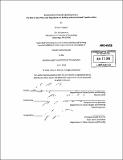Breaking new ground in building green : the role of city policy and regulation in a building industry market transformation
Author(s)
Prakash, Shiva R
DownloadFull printable version (4.954Mb)
Alternative title
Role of city policy and regulation in a building industry market transformation
Other Contributors
Massachusetts Institute of Technology. Dept. of Urban Studies and Planning.
Advisor
Harvey Michaels.
Terms of use
Metadata
Show full item recordAbstract
With a growing awareness of the need for a widespread reduction in the use of natural resources, including energy and water, buildings have been identified as a key component of America's, and the world's, drain on these finite resources. However, changing building practices that have been the norm for more than a century has proven to be a difficult task, with many challenges and interests to be accounted for. Implementing green building policies has not yet become a standard practice in most U.S. cities. This study looks at various policy approaches and outcomes that aim to address the impediments to a market transformation towards greener building. Among the cities that boast a significant amount of green buildings certified by a third-party rating system, many different factors and dynamics, with varying participation and responses from the public, private and non-profit sectors have resulted in different outcomes with respect to green building in that particular city. This study looks at the green building policy and implementation landscape in four cities: Boston, Boulder, Pittsburgh and San Francisco. Each of these case studies offers a robust look at how green building policies were created, both the process and the implementation, and the building industry's response to these policies and programs. In addition, it looks at other players and circumstances that contributed to the dynamics that surfaced in that city. Primarily, the goal of this study is to glean lessons from these four cities, to draw some general conclusions about what elements effective green building policy incorporates and the process and implementation strategies that resulted in success in practice. The conclusions also identify the supporting factors that play an indispensable role in a successful outcome. Ideally this study may offer some general guidance for cities that are considering how best to approach this particular challenge and aid in structuring a green building policy that will produce concrete results. The general findings of this study are that effective green building policy should facilitate a market transformation in the building industry towards greener development through mechanisms that address both the supply and demand of green building products and services. Successful policies were designed to stimulate market potential so the practice of greener building would ultimately be profitable to developers, building professionals and valued by consumers. The obstacles to green building becoming a norm in the building industry can be initially overcome by thoughtful, tailored policy and can be ultimately sustained by pure market forces.
Description
Thesis (M.C.P.)--Massachusetts Institute of Technology, Dept. of Urban Studies and Planning, 2010. Cataloged from PDF version of thesis. Includes bibliographical references (p. 96-99).
Date issued
2010Department
Massachusetts Institute of Technology. Department of Urban Studies and PlanningPublisher
Massachusetts Institute of Technology
Keywords
Urban Studies and Planning.